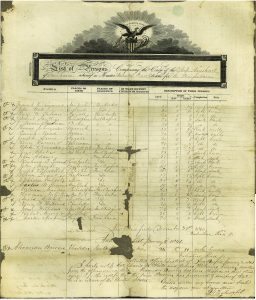Herman Melville – Bercaw Edwards, Mary (2009)
Herman Melville – Bercaw Edwards, Mary (2009)
It appears that you’ve mentioned the name “Herman Melville” along with the reference “Bercaw Edwards, Mary (2009).” However, it’s not clear what specific information or context you’re looking for regarding Herman Melville and this reference.
Herman Melville (1819-1891) was an American novelist, short story writer, and poet best known for his novel “Moby-Dick,” which is considered one of the greatest works of American literature. If you have any specific questions or if there’s something specific you’d like to know about Herman Melville or the reference you’ve provided, please feel free to provide more details, and I’d be happy to assist you further.

Herman Melville – Bercaw Edwards, Mary (2009)
- Bercaw Edwards, Mary (2009). “Questioning Typee”. Leviathan. 11 (2): 24–42. doi:10.1111/j.1750-1849.2009.01340.x. ISSN 1525-6995.
- Bezanson, Walter (1986). “Moby-Dick: Document, Drama, Dream”. In Bryant, John (ed.). A Companion to Melville Studies. Westport, Connecticut: Greenwood Press. ISBN 978-0-313-23874-1. OCLC 473782787.
- Buell, Lawrence (1998). “Melville The Poet”. In Levine, Robert (ed.). The Cambridge Companion to Melville. Cambridge University Press. Archived from the original on May 12, 2016.
- Chapin, Henry (1922). Introduction. John Marr & Other Poems. By Melville, Herman. Princeton, NJ: Princeton University Press.
Bạn đang đọc: Herman Melville – Wikipedia
- Hardwick, Elizabeth (2000). Herman Melville. Penguin. p. 65.
- Horth, Lynn, ed. (1993). Correspondence. The Writings of Herman Melville. Vol. Fourteen. Evanston and Chicago: Northwestern University Press and The Newberry Library. ISBN 0-8101-0995-6.
- Hutchins, Zach (2014). “Herman Melville’s Fejee Mermaid, or a Confidence Man at the Lycuem”. ESQ. 60 (1): 75–109. doi:10.1353/esq.2014.0004. S2CID 162189302.
- Kennedy, Frederick James (March 1977). “Herman Melville’s Lecture in Montreal”. The New England Quarterly. 50 (1): 125–137. doi:10.2307/364707. JSTOR 364707.
- Kennedy, Joyce Deveau; Kennedy, Frederick James (February 1978). “Elizabeth and Herman” ( PDF ). Melville Society Extracts (33): 4–12.[clarification needed]
- Levine, Robert (2014). “Chronology of Melville’s Life”. In Levine, Robert (ed.). The New Cambridge Companion to Herman Melville. New York: Cambridge University Press. ISBN 978-1107470422.
- Matthiessen, F. O. (1966) [1941]. American Renaissance: Art and Expression in the Age of Emerson and Whitman (Tenth Printing ed.). New York, London and Toronto: Oxford University Press.
- Melville, Herman (1973). Hillway, Tyrus (ed.). MardiISBN 9780805772562.
- Melville, Herman (1957). PierreOCLC 1019941646.
- “Leviathan: A Journal of Melville Studies”. melvillesociety.org. The Melville Society. Archived from the original on November 2, 2016 .
- Olsen-Smith, Steven (2015). “”Introduction” and “Chronology””. In Olsen-Smith, Steven (ed.). Melville in His Own Time: A Biographical Chronicle of His Life, Drawn from Recollection, Interviews, and Memoirs by Family, Friends, and Associates. Iowa City: University of Iowa Press. ISBN 978-1-60938-333-6.
- Page, William (1986). “The place of law and literature”. Vanderbilt Law Review. 39 (2): 391–418.
- Parker, Hershel (1988). “Historical Note”. In Hayford, Harrison; Parker, Hershel; Tanselle, G. Thomas (eds.). Moby-Dick, or, the Whale. The writings of Herman Melville. Vol. 6. Evanston; Chicago: Northwestern University Press; Newberry Library. ISBN 0810103249.
- Parker, Hershel (Winter 1990). “Billy Budd, Foretopman and the Dynamics of Canonization”. College Literature. 1. 17 (1): 21–32. JSTOR 25111840.
- Person, Leland S. (2006). “Gender and sexuality”. In Kelley, Wyn (ed.). A Companion to Herman Melville. ISBN 9781405171946.
- Piety, Tamara R. “Something Fishy: Or Why I Make My Students Read Fast-Fish And Loose-Fish” ( PDF ). Vermont Law Review. 29 (33): 33, 37, 39 .
- Rosenberg, Warren (1984). “‘Deeper than Sappho’: Melville, poetry, and the Erotic”. Modern Language Studies. 14 (1): 70–78. doi:10.2307/3194508. JSTOR 3194508.
- Sandberg, Alvin (1968). “Erotic Patterns in ‘The Paradise of Bachelors and the Tartarus of Maids'”. Literature and Psychology. 18 (1): 2–8.
- Scharnhorst, Gary (Spring 1983). “Biographical Blindspots: The Case of the Cousins Alger”. Biography. 6 (2): 136–147. doi:10.1353/bio.2010.0651. JSTOR 23538983. S2CID 161222133.
- Scott Standard Postage Catalog. Vol. 1. Sidney, Ohio: Scott Publishing Company. 2000. Scott #2094.
- Serlin, David Harley (1995). “The Dialogue of Gender in Melville’s The Paradise of Bachelors and the Tartarus of Maids“. Modern Language Studies. 25 (2): 80–87. doi:10.2307/3195291. JSTOR 3195291.
- Shneidman, E. S. (1976). “Some psychological reflections on the death of Malcolm Melville”. Suicide Life Threat Behav. 6 (4): 231–242. PMID 799381.
- Tick, Edward (August 17, 1986). “Melville Ashore”. The New York Times. Archived from the original on October 5, 2019.
- Titus, David K. (May 1980). “Herman Melville at the Albany Academy”. Melville Society Extracts (42): 1, 4–10. Archived from the original on March 3, 2016 .
- Vendler, Helen (1995). Selected Poems of Herman Melville. San Francisco: Arion Press.
- Wallace, Robert K. (1992). Melville & Turner: Spheres of Love and Fright. The University of Georgia Press. ISBN 0-8203-1366-1.
Xem thêm: Giáo dục Hoa Kỳ – Wikipedia tiếng Việt
“Wallace explores the stylistic and aesthetic affinities of English landscape painter J. M. W. Turner (1775-1851) and American novelist Herman Melville, establishing Turner as a decisive influence on the creation of Melville’s Moby-Dick“. (Quotation from dust jacket)
- Weisberg, Richard (1984). The Failure of the Word: The Lawyer as Protagonist in Modern Fiction. New Haven, Connecticut: Yale University Press. ISBN 9780300045925. OCLC 1032720496.
- Wilson, Scott (2016). Resting Places: The Burial Sites of More Than 14,000 Famous Persons (3rd (Kindle) ed.). McFarland & Company. OCLC 957437234.
- Wright, Nathalia (May 1940). “Biblical Allusion in Melville’s Prose”. American Literature. 12 (2): 185–199. doi:10.2307/2920476. JSTOR 2920476.
Source: https://suadieuhoa.edu.vn
Category : American















